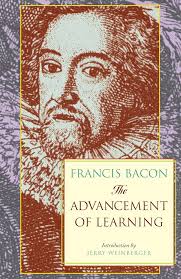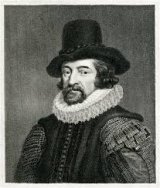The Advancement of Learning Page #19
The Advancement of Learning, published by Francis Bacon in 1605, is a foundational text in the history of science and philosophy. In this work, Bacon advocates for empirical research and the systematic organization of knowledge, laying the groundwork for the scientific method. The book critiques existing scholarly practices and proposes a new approach to learning based on observation and experimentation. It marks a significant shift towards modern scientific inquiry.
- Year:
- 1605
- 1,169 Views
Submitted by acronimous on August 11, 2024
Modified by acronimous on August 11, 2024
over the will; for it is a commandment over the reason, belief, and understanding of man, which is the highest part of the mind, and giveth law to the will itself. For there is no power on earth which setteth up a throne or chair of estate in the spirits and souls of men, and in their cogitations, imaginations, opinions, and beliefs, but knowledge and learning. And therefore we see the detestable and extreme pleasure that arch-heretics, and false prophets, and impostors are transported with, when they once find in themselves that they have a superiority in the faith and conscience of men; so great as if they have once tasted of it, it is seldom seen that any torture or persecution can make them relinquish or abandon it. But as this is that which the author of the Revelation calleth the depth or profoundness of Satan, so by argument of contraries, the just and lawful sovereignty over men’s understanding, by force of truth rightly interpreted, is that which approacheth nearest to the similitude of the divine rule. (4) As for fortune and advancement, the beneficence of learning is not so confined to give fortune only to states and commonwealths, as it doth not likewise give fortune to particular persons. For it was well noted long ago, that Homer hath given more men their livings, than either Sylla, or Cæsar, or Augustus ever did, notwithstanding their great largesses and donatives, and distributions of lands to so many legions. And no doubt it is hard to say whether arms or learning have advanced greater numbers. And in case of sovereignty we see, that if arms or descent have carried away the kingdom, yet learning hath carried the priesthood, which ever hath been in some competition with empire. (5) Again, for the pleasure and delight of knowledge and learning, it far surpasseth all other in nature. For, shall the pleasures of the affections so exceed the pleasure of the sense, as much as the obtaining of desire or victory exceedeth a song or a dinner? and must not of consequence the pleasures of the intellect or understanding exceed the pleasures of the affections? We see in all other pleasures there is satiety, and after they be used, their verdure departeth, which showeth well they be but deceits of pleasure, and not pleasures; and that it was the novelty which pleased, and not the quality. And, therefore, we see that voluptuous men turn friars, and ambitions princes turn melancholy. But of knowledge there is no satiety, but satisfaction and appetite are perpetually interchangeable; and, therefore, appeareth to be good in itself simply, without fallacy or accident. Neither is that pleasure of small efficacy and contentment to the mind of man, which the poet Lucretius describeth elegantly:— “Suave mari magno, turbantibus æquora ventis, &c.” “It is a view of delight,” saith he, “to stand or walk upon the shore side, and to see a ship tossed with tempest upon the sea; or to be in a fortified tower, and to see two battles join upon a plain. But it is a pleasure incomparable, for the mind of man to be settled, landed, and fortified in the certainty of truth; and from thence to descry and behold the errors, perturbations, labours, and wanderings up and down of other men.” (6) Lastly, leaving the vulgar arguments, that by learning man excelleth man in that wherein man excelleth beasts; that by learning man ascendeth to the heavens and their motions, where in body he cannot come; and the like: let us conclude with the dignity and excellency of knowledge and learning in that whereunto man’s nature doth most aspire, which is immortality, or continuance; for to this tendeth generation, and raising of houses and families; to this tend buildings, foundations, and monuments; to this tendeth the desire of memory, fame, and celebration; and in effect the strength of all other human desires. We see then how far the monuments of wit and learning are more durable than the monuments of power or of the hands. For have not the verses of Homer continued twenty-five hundred years, or more, without the loss of a syllable or letter; during which the infinite palaces, temples, castles, cities, have been decayed and demolished? It is not possible to have the true pictures or statues of Cyrus, Alexander, Cæsar, no nor of the kings or great personages of much later years; for the originals cannot last, and the copies cannot but leese of the life and truth. But the images of men’s wits and knowledges remain in books, exempted from the wrong of time and capable of perpetual renovation. Neither are they fitly to be called images, because they generate still, and cast their seeds in the minds of others, provoking and causing infinite actions and opinions in succeeding ages. So that if the invention of the ship was thought so noble, which carrieth riches and commodities from place to place, and consociateth the most remote regions in participation of their fruits, how much more are letters to be magnified, which as ships pass through the vast seas of time, and make ages so distant to participate of the wisdom, illuminations, and inventions, the one of the other? Nay, further, we see some of the philosophers which were least divine, and most immersed in the senses, and denied generally the immortality of the soul, yet came to this point, that whatsoever motions the spirit of man could act and perform without the organs of the body, they thought might remain after death, which were only those of the understanding and not of the affection; so immortal and incorruptible a thing did knowledge seem unto them to be. But we, that know by divine revelation that not only the understanding but the affections purified, not only the spirit but the body changed, shall be advanced to immortality, do disclaim in these rudiments of the senses. But it must be remembered, both in this last point, and so it may likewise be needful in other places, that in probation of the dignity of knowledge or learning, I did in the beginning separate divine testimony from human, which method I have pursued, and so handled them both apart. (7) Nevertheless I do not pretend, and I know it will be impossible for me, by any pleading of mine, to reverse the judgment, either of Æsop’s cock, that preferred the barleycorn before the gem; or of Midas, that being chosen judge between Apollo, president of the Muses, and Pan, god of the flocks, judged for plenty; or of Paris, that judged for beauty and love against wisdom and power; or of Agrippina, occidat matrem, modo imperet, that preferred empire with any condition never so detestable; or of Ulysses, qui vetulam prætulit immortalitati, being a figure of those which prefer custom and habit before all excellency, or of a number of the like popular judgments. For these things must continue as they have been; but so will that also continue whereupon learning hath ever
Translation
Translate and read this book in other languages:
Select another language:
- - Select -
- 简体中文 (Chinese - Simplified)
- 繁體中文 (Chinese - Traditional)
- Español (Spanish)
- Esperanto (Esperanto)
- 日本語 (Japanese)
- Português (Portuguese)
- Deutsch (German)
- العربية (Arabic)
- Français (French)
- Русский (Russian)
- ಕನ್ನಡ (Kannada)
- 한국어 (Korean)
- עברית (Hebrew)
- Gaeilge (Irish)
- Українська (Ukrainian)
- اردو (Urdu)
- Magyar (Hungarian)
- मानक हिन्दी (Hindi)
- Indonesia (Indonesian)
- Italiano (Italian)
- தமிழ் (Tamil)
- Türkçe (Turkish)
- తెలుగు (Telugu)
- ภาษาไทย (Thai)
- Tiếng Việt (Vietnamese)
- Čeština (Czech)
- Polski (Polish)
- Bahasa Indonesia (Indonesian)
- Românește (Romanian)
- Nederlands (Dutch)
- Ελληνικά (Greek)
- Latinum (Latin)
- Svenska (Swedish)
- Dansk (Danish)
- Suomi (Finnish)
- فارسی (Persian)
- ייִדיש (Yiddish)
- հայերեն (Armenian)
- Norsk (Norwegian)
- English (English)
Citation
Use the citation below to add this book to your bibliography:
Style:MLAChicagoAPA
"The Advancement of Learning Books." Literature.com. STANDS4 LLC, 2025. Web. 10 Mar. 2025. <https://www.literature.com/book/the_advancement_of_learning_3165>.








Discuss this The Advancement of Learning book with the community:
Report Comment
We're doing our best to make sure our content is useful, accurate and safe.
If by any chance you spot an inappropriate comment while navigating through our website please use this form to let us know, and we'll take care of it shortly.
Attachment
You need to be logged in to favorite.
Log In